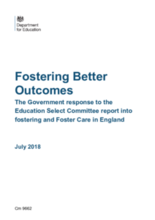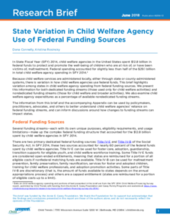Displaying 1191 - 1200 of 2221
This paper sets out the government’s response to two reports into foster care: The Education Select Committee Inquiry into Fostering and the Foster Care in England report, an independent review commissioned by the Department for Education. The response describes the government’s vision for foster care and improvements for the system, based on the recommendations of the two reports.
The aim of the article is to describe and discuss how issues related to schooling and educational achievement are recognized and addressed in social services case files for children and young people placed in out-of-home care (OHC) in the city of Gothenburg, Sweden.
This qualitative interview study examined experiences of youth-initiated mentoring relationships (YIM) among youth transitioning out of the foster care system.
This brief highlights variation among states in child welfare agency spending from federal funding sources.
This article reviews developments in the Australian NSW child protection system which aim to reduce the number of children in state care.
This study used Group Concept Mapping (GCM) with a sample of 31 foster youth and alumni to explicate a conceptual framework for effective legal representation.
This meta‐analytic review examines the presence and quality of close peer relationships for adoptees and individuals with foster care experience.
In this study, the authors used a two-year Texas foster care entry cohort to examine the extent to which children experience “progress moves”, such as moving to a sibling placement or to live with a relative, versus non-progress moves, such as moving due to risk of abuse.
This study examines how a child welfare agency implemented an innovative pilot initiative designed to promote timely family reunification.
This article examines child well-being among African American adolescents in care—a group that is overrepresented within the foster care system. Specific attention is given to relational permanence—the concept of continuous supportive relationships marked by mutual trust and respect.


